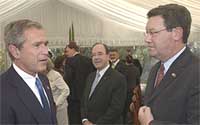Censorship of Climate Scientists Heats Up
Submitted by Diane Farsetta on
"Prompted by reports that [Bush] administration appointees, including a former oil industry lobbyist who was chief of staff at the [White House] Council on Environmental Quality, edited climate change reports or pressured scientists to tone down statements about the dangers of global warming," the U.S.

 The Australian Minister for Foreign Affairs,
The Australian Minister for Foreign Affairs,  Federal district Judge Jack B.
Federal district Judge Jack B.